Economic Policy Analysis of Brexit's Effects on UK Standards of Living
VerifiedAdded on 2022/07/19
|11
|3878
|213
Essay
AI Summary
This essay provides an economic policy analysis of the potential positive and negative effects of Brexit on the standards of living in the United Kingdom. It begins with an introduction to Brexit, highlighting its economic implications on trade, income, and consumer prices. The essay then delves into the impact of inflation and exchange rates, discussing the depreciation of the Pound Sterling and its effects on consumer prices. It analyzes the effects on SMEs, the labor market, and immigration, providing statistical evidence. The analysis covers various aspects, including trade barriers, changes in import prices, and the impact on different sectors and income levels. The essay emphasizes the challenges faced by SMEs and the labor market, including decline in capital investment, less market access, less innovation, and higher regulations. It concludes by summarizing the multifaceted economic consequences of Brexit on the UK, offering insights into its long-term implications for the country's economic well-being.
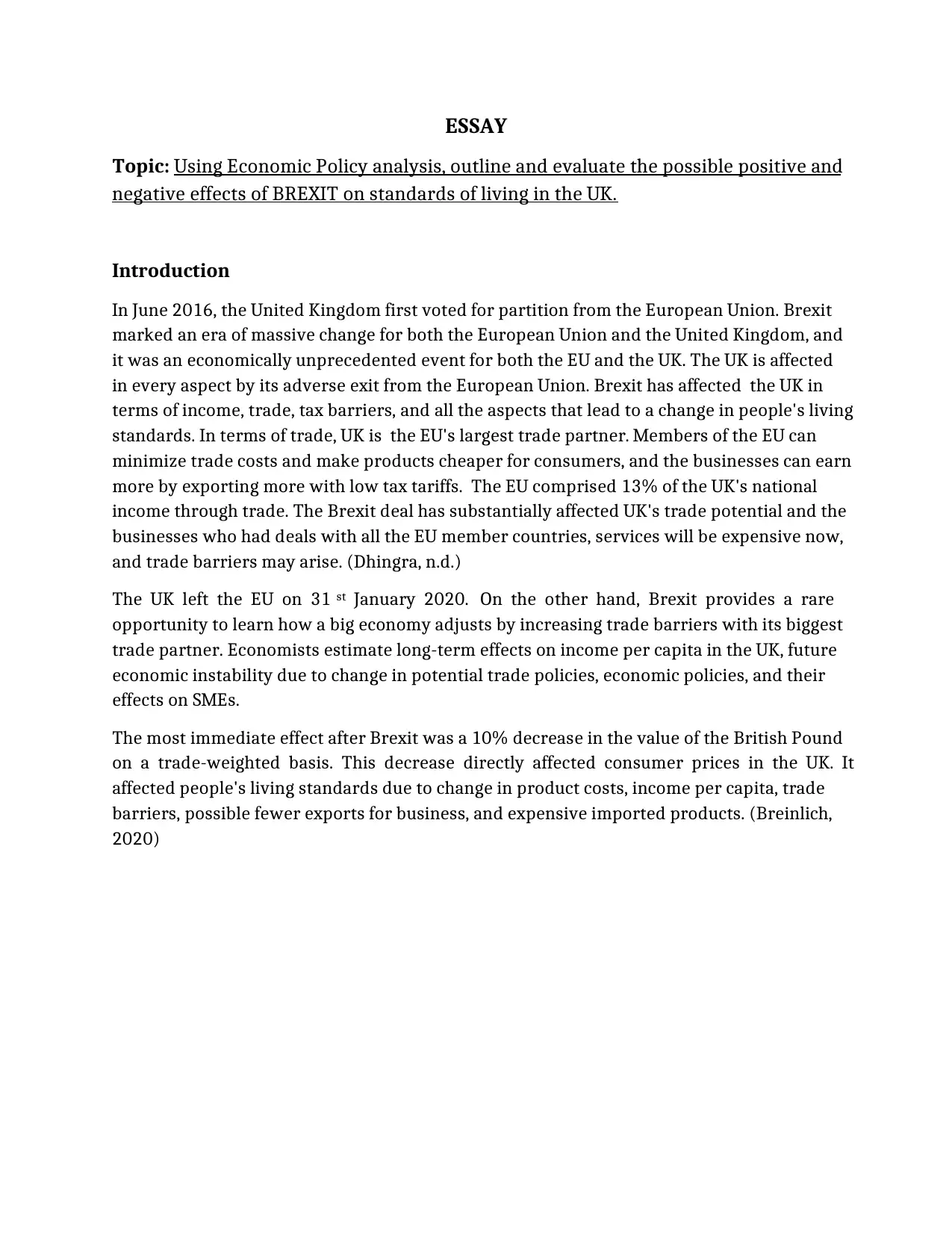
ESSAY
Topic: Using Economic Policy analysis, outline and evaluate the possible positive and
negative effects of BREXIT on standards of living in the UK.
Introduction
In June 2016, the United Kingdom first voted for partition from the European Union. Brexit
marked an era of massive change for both the European Union and the United Kingdom, and
it was an economically unprecedented event for both the EU and the UK. The UK is affected
in every aspect by its adverse exit from the European Union. Brexit has affected the UK in
terms of income, trade, tax barriers, and all the aspects that lead to a change in people's living
standards. In terms of trade, UK is the EU's largest trade partner. Members of the EU can
minimize trade costs and make products cheaper for consumers, and the businesses can earn
more by exporting more with low tax tariffs. The EU comprised 13% of the UK's national
income through trade. The Brexit deal has substantially affected UK's trade potential and the
businesses who had deals with all the EU member countries, services will be expensive now,
and trade barriers may arise. (Dhingra, n.d.)
The UK left the EU on 31 st January 2020. On the other hand, Brexit provides a rare
opportunity to learn how a big economy adjusts by increasing trade barriers with its biggest
trade partner. Economists estimate long-term effects on income per capita in the UK, future
economic instability due to change in potential trade policies, economic policies, and their
effects on SMEs.
The most immediate effect after Brexit was a 10% decrease in the value of the British Pound
on a trade-weighted basis. This decrease directly affected consumer prices in the UK. It
affected people's living standards due to change in product costs, income per capita, trade
barriers, possible fewer exports for business, and expensive imported products. (Breinlich,
2020)
Topic: Using Economic Policy analysis, outline and evaluate the possible positive and
negative effects of BREXIT on standards of living in the UK.
Introduction
In June 2016, the United Kingdom first voted for partition from the European Union. Brexit
marked an era of massive change for both the European Union and the United Kingdom, and
it was an economically unprecedented event for both the EU and the UK. The UK is affected
in every aspect by its adverse exit from the European Union. Brexit has affected the UK in
terms of income, trade, tax barriers, and all the aspects that lead to a change in people's living
standards. In terms of trade, UK is the EU's largest trade partner. Members of the EU can
minimize trade costs and make products cheaper for consumers, and the businesses can earn
more by exporting more with low tax tariffs. The EU comprised 13% of the UK's national
income through trade. The Brexit deal has substantially affected UK's trade potential and the
businesses who had deals with all the EU member countries, services will be expensive now,
and trade barriers may arise. (Dhingra, n.d.)
The UK left the EU on 31 st January 2020. On the other hand, Brexit provides a rare
opportunity to learn how a big economy adjusts by increasing trade barriers with its biggest
trade partner. Economists estimate long-term effects on income per capita in the UK, future
economic instability due to change in potential trade policies, economic policies, and their
effects on SMEs.
The most immediate effect after Brexit was a 10% decrease in the value of the British Pound
on a trade-weighted basis. This decrease directly affected consumer prices in the UK. It
affected people's living standards due to change in product costs, income per capita, trade
barriers, possible fewer exports for business, and expensive imported products. (Breinlich,
2020)
Paraphrase This Document
Need a fresh take? Get an instant paraphrase of this document with our AI Paraphraser
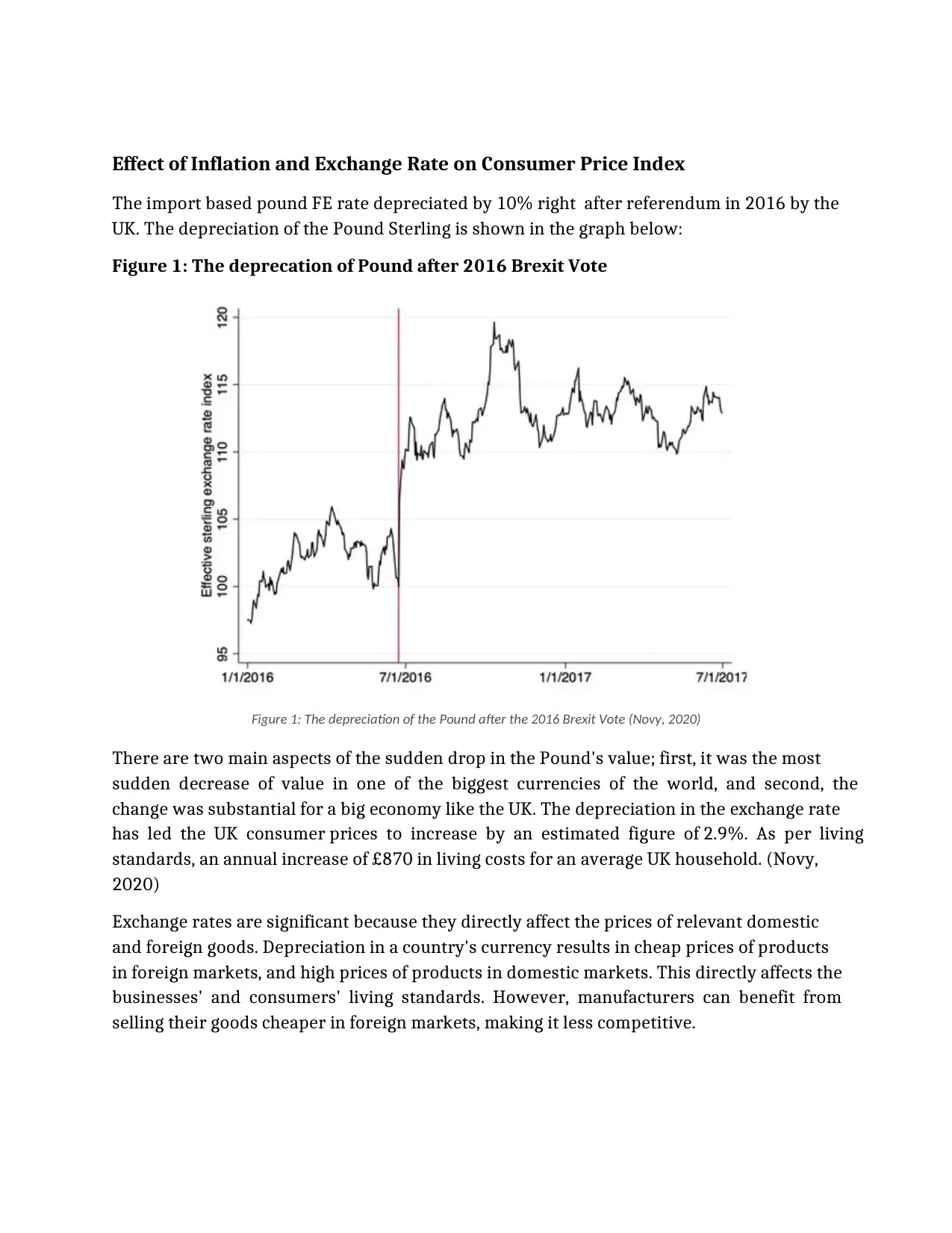
Effect of Inflation and Exchange Rate on Consumer Price Index
The import based pound FE rate depreciated by 10% right after referendum in 2016 by the
UK. The depreciation of the Pound Sterling is shown in the graph below:
Figure 1: The deprecation of Pound after 2016 Brexit Vote
Figure 1: The depreciation of the Pound after the 2016 Brexit Vote (Novy, 2020)
There are two main aspects of the sudden drop in the Pound's value; first, it was the most
sudden decrease of value in one of the biggest currencies of the world, and second, the
change was substantial for a big economy like the UK. The depreciation in the exchange rate
has led the UK consumer prices to increase by an estimated figure of 2.9%. As per living
standards, an annual increase of £870 in living costs for an average UK household. (Novy,
2020)
Exchange rates are significant because they directly affect the prices of relevant domestic
and foreign goods. Depreciation in a country's currency results in cheap prices of products
in foreign markets, and high prices of products in domestic markets. This directly affects the
businesses' and consumers' living standards. However, manufacturers can benefit from
selling their goods cheaper in foreign markets, making it less competitive.
The import based pound FE rate depreciated by 10% right after referendum in 2016 by the
UK. The depreciation of the Pound Sterling is shown in the graph below:
Figure 1: The deprecation of Pound after 2016 Brexit Vote
Figure 1: The depreciation of the Pound after the 2016 Brexit Vote (Novy, 2020)
There are two main aspects of the sudden drop in the Pound's value; first, it was the most
sudden decrease of value in one of the biggest currencies of the world, and second, the
change was substantial for a big economy like the UK. The depreciation in the exchange rate
has led the UK consumer prices to increase by an estimated figure of 2.9%. As per living
standards, an annual increase of £870 in living costs for an average UK household. (Novy,
2020)
Exchange rates are significant because they directly affect the prices of relevant domestic
and foreign goods. Depreciation in a country's currency results in cheap prices of products
in foreign markets, and high prices of products in domestic markets. This directly affects the
businesses' and consumers' living standards. However, manufacturers can benefit from
selling their goods cheaper in foreign markets, making it less competitive.
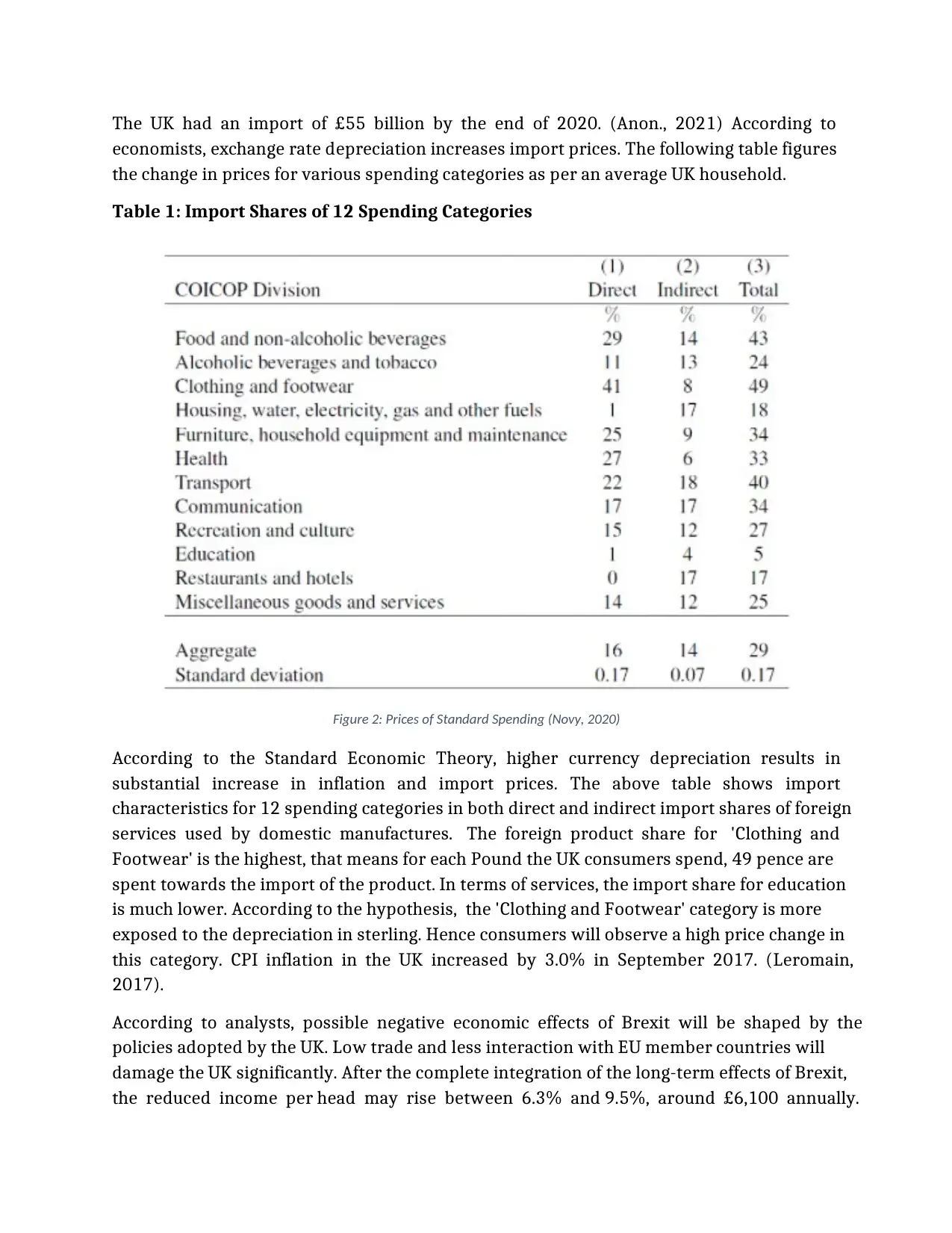
The UK had an import of £55 billion by the end of 2020. (Anon., 2021) According to
economists, exchange rate depreciation increases import prices. The following table figures
the change in prices for various spending categories as per an average UK household.
Table 1: Import Shares of 12 Spending Categories
Figure 2: Prices of Standard Spending (Novy, 2020)
According to the Standard Economic Theory, higher currency depreciation results in
substantial increase in inflation and import prices. The above table shows import
characteristics for 12 spending categories in both direct and indirect import shares of foreign
services used by domestic manufactures. The foreign product share for 'Clothing and
Footwear' is the highest, that means for each Pound the UK consumers spend, 49 pence are
spent towards the import of the product. In terms of services, the import share for education
is much lower. According to the hypothesis, the 'Clothing and Footwear' category is more
exposed to the depreciation in sterling. Hence consumers will observe a high price change in
this category. CPI inflation in the UK increased by 3.0% in September 2017. (Leromain,
2017).
According to analysts, possible negative economic effects of Brexit will be shaped by the
policies adopted by the UK. Low trade and less interaction with EU member countries will
damage the UK significantly. After the complete integration of the long-term effects of Brexit,
the reduced income per head may rise between 6.3% and 9.5%, around £6,100 annually.
economists, exchange rate depreciation increases import prices. The following table figures
the change in prices for various spending categories as per an average UK household.
Table 1: Import Shares of 12 Spending Categories
Figure 2: Prices of Standard Spending (Novy, 2020)
According to the Standard Economic Theory, higher currency depreciation results in
substantial increase in inflation and import prices. The above table shows import
characteristics for 12 spending categories in both direct and indirect import shares of foreign
services used by domestic manufactures. The foreign product share for 'Clothing and
Footwear' is the highest, that means for each Pound the UK consumers spend, 49 pence are
spent towards the import of the product. In terms of services, the import share for education
is much lower. According to the hypothesis, the 'Clothing and Footwear' category is more
exposed to the depreciation in sterling. Hence consumers will observe a high price change in
this category. CPI inflation in the UK increased by 3.0% in September 2017. (Leromain,
2017).
According to analysts, possible negative economic effects of Brexit will be shaped by the
policies adopted by the UK. Low trade and less interaction with EU member countries will
damage the UK significantly. After the complete integration of the long-term effects of Brexit,
the reduced income per head may rise between 6.3% and 9.5%, around £6,100 annually.
⊘ This is a preview!⊘
Do you want full access?
Subscribe today to unlock all pages.

Trusted by 1+ million students worldwide
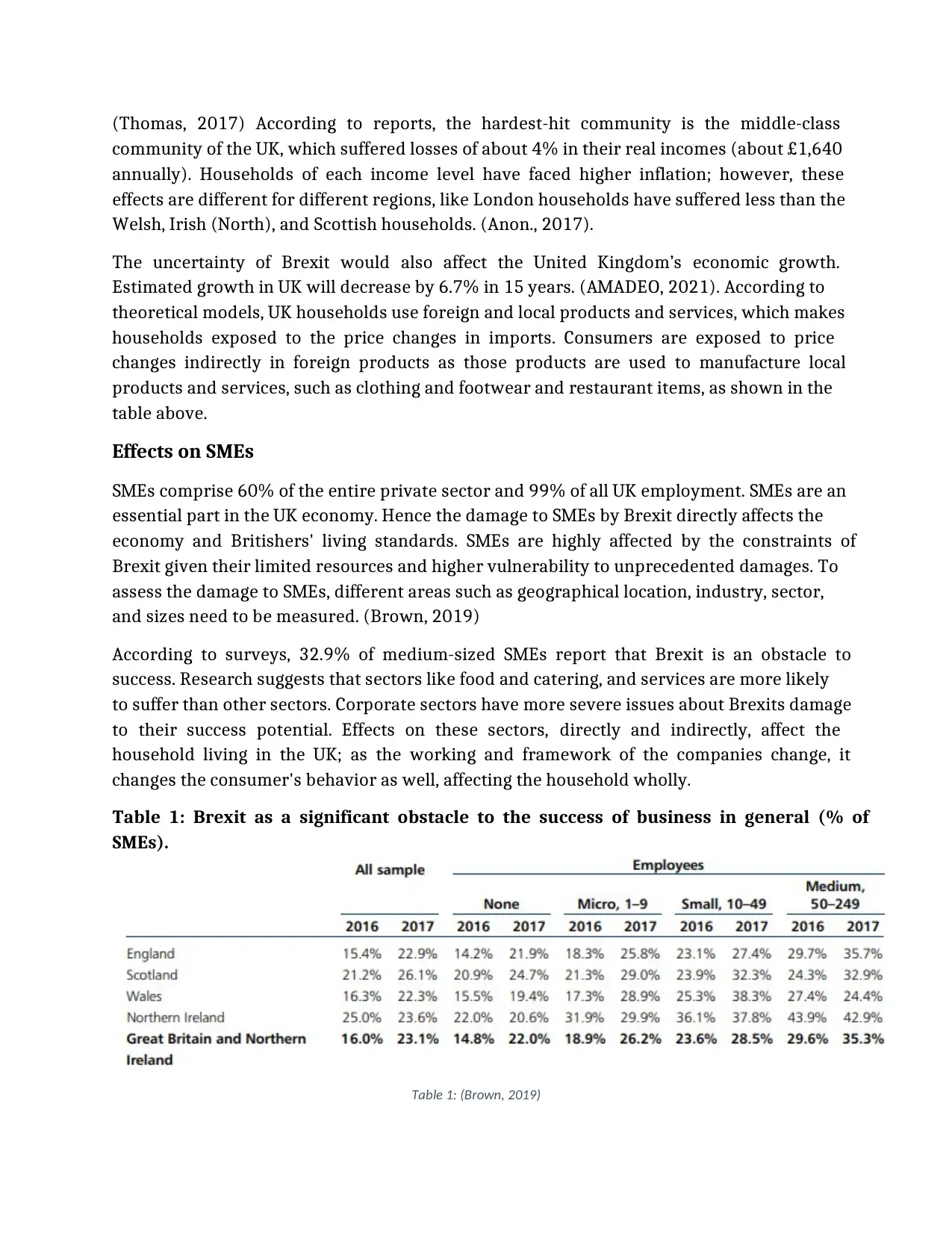
(Thomas, 2017) According to reports, the hardest-hit community is the middle-class
community of the UK, which suffered losses of about 4% in their real incomes (about £1,640
annually). Households of each income level have faced higher inflation; however, these
effects are different for different regions, like London households have suffered less than the
Welsh, Irish (North), and Scottish households. (Anon., 2017).
The uncertainty of Brexit would also affect the United Kingdom’s economic growth.
Estimated growth in UK will decrease by 6.7% in 15 years. (AMADEO, 2021). According to
theoretical models, UK households use foreign and local products and services, which makes
households exposed to the price changes in imports. Consumers are exposed to price
changes indirectly in foreign products as those products are used to manufacture local
products and services, such as clothing and footwear and restaurant items, as shown in the
table above.
Effects on SMEs
SMEs comprise 60% of the entire private sector and 99% of all UK employment. SMEs are an
essential part in the UK economy. Hence the damage to SMEs by Brexit directly affects the
economy and Britishers' living standards. SMEs are highly affected by the constraints of
Brexit given their limited resources and higher vulnerability to unprecedented damages. To
assess the damage to SMEs, different areas such as geographical location, industry, sector,
and sizes need to be measured. (Brown, 2019)
According to surveys, 32.9% of medium-sized SMEs report that Brexit is an obstacle to
success. Research suggests that sectors like food and catering, and services are more likely
to suffer than other sectors. Corporate sectors have more severe issues about Brexits damage
to their success potential. Effects on these sectors, directly and indirectly, affect the
household living in the UK; as the working and framework of the companies change, it
changes the consumer's behavior as well, affecting the household wholly.
Table 1: Brexit as a significant obstacle to the success of business in general (% of
SMEs).
Table 1: (Brown, 2019)
community of the UK, which suffered losses of about 4% in their real incomes (about £1,640
annually). Households of each income level have faced higher inflation; however, these
effects are different for different regions, like London households have suffered less than the
Welsh, Irish (North), and Scottish households. (Anon., 2017).
The uncertainty of Brexit would also affect the United Kingdom’s economic growth.
Estimated growth in UK will decrease by 6.7% in 15 years. (AMADEO, 2021). According to
theoretical models, UK households use foreign and local products and services, which makes
households exposed to the price changes in imports. Consumers are exposed to price
changes indirectly in foreign products as those products are used to manufacture local
products and services, such as clothing and footwear and restaurant items, as shown in the
table above.
Effects on SMEs
SMEs comprise 60% of the entire private sector and 99% of all UK employment. SMEs are an
essential part in the UK economy. Hence the damage to SMEs by Brexit directly affects the
economy and Britishers' living standards. SMEs are highly affected by the constraints of
Brexit given their limited resources and higher vulnerability to unprecedented damages. To
assess the damage to SMEs, different areas such as geographical location, industry, sector,
and sizes need to be measured. (Brown, 2019)
According to surveys, 32.9% of medium-sized SMEs report that Brexit is an obstacle to
success. Research suggests that sectors like food and catering, and services are more likely
to suffer than other sectors. Corporate sectors have more severe issues about Brexits damage
to their success potential. Effects on these sectors, directly and indirectly, affect the
household living in the UK; as the working and framework of the companies change, it
changes the consumer's behavior as well, affecting the household wholly.
Table 1: Brexit as a significant obstacle to the success of business in general (% of
SMEs).
Table 1: (Brown, 2019)
Paraphrase This Document
Need a fresh take? Get an instant paraphrase of this document with our AI Paraphraser
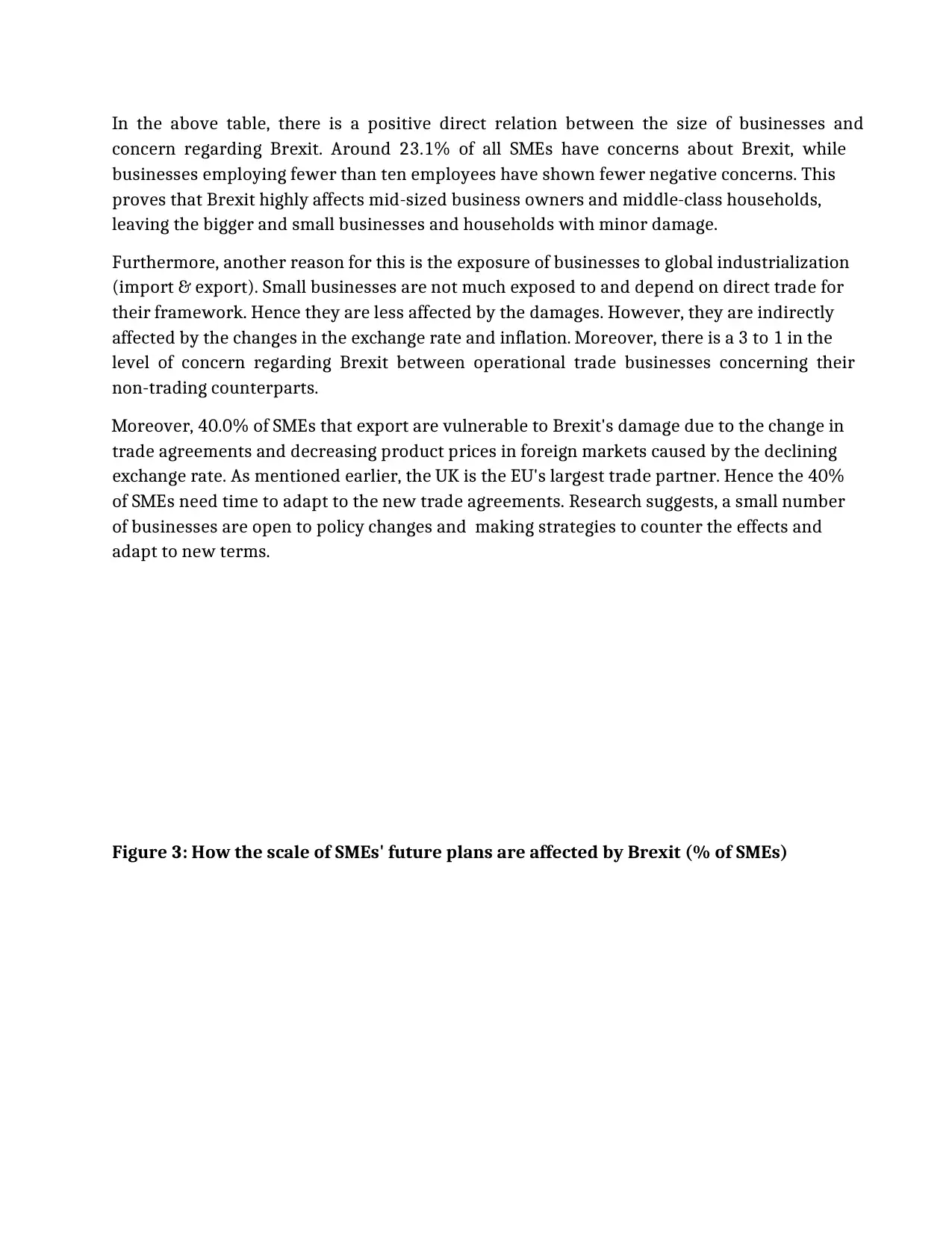
In the above table, there is a positive direct relation between the size of businesses and
concern regarding Brexit. Around 23.1% of all SMEs have concerns about Brexit, while
businesses employing fewer than ten employees have shown fewer negative concerns. This
proves that Brexit highly affects mid-sized business owners and middle-class households,
leaving the bigger and small businesses and households with minor damage.
Furthermore, another reason for this is the exposure of businesses to global industrialization
(import & export). Small businesses are not much exposed to and depend on direct trade for
their framework. Hence they are less affected by the damages. However, they are indirectly
affected by the changes in the exchange rate and inflation. Moreover, there is a 3 to 1 in the
level of concern regarding Brexit between operational trade businesses concerning their
non-trading counterparts.
Moreover, 40.0% of SMEs that export are vulnerable to Brexit's damage due to the change in
trade agreements and decreasing product prices in foreign markets caused by the declining
exchange rate. As mentioned earlier, the UK is the EU's largest trade partner. Hence the 40%
of SMEs need time to adapt to the new trade agreements. Research suggests, a small number
of businesses are open to policy changes and making strategies to counter the effects and
adapt to new terms.
Figure 3: How the scale of SMEs' future plans are affected by Brexit (% of SMEs)
concern regarding Brexit. Around 23.1% of all SMEs have concerns about Brexit, while
businesses employing fewer than ten employees have shown fewer negative concerns. This
proves that Brexit highly affects mid-sized business owners and middle-class households,
leaving the bigger and small businesses and households with minor damage.
Furthermore, another reason for this is the exposure of businesses to global industrialization
(import & export). Small businesses are not much exposed to and depend on direct trade for
their framework. Hence they are less affected by the damages. However, they are indirectly
affected by the changes in the exchange rate and inflation. Moreover, there is a 3 to 1 in the
level of concern regarding Brexit between operational trade businesses concerning their
non-trading counterparts.
Moreover, 40.0% of SMEs that export are vulnerable to Brexit's damage due to the change in
trade agreements and decreasing product prices in foreign markets caused by the declining
exchange rate. As mentioned earlier, the UK is the EU's largest trade partner. Hence the 40%
of SMEs need time to adapt to the new trade agreements. Research suggests, a small number
of businesses are open to policy changes and making strategies to counter the effects and
adapt to new terms.
Figure 3: How the scale of SMEs' future plans are affected by Brexit (% of SMEs)
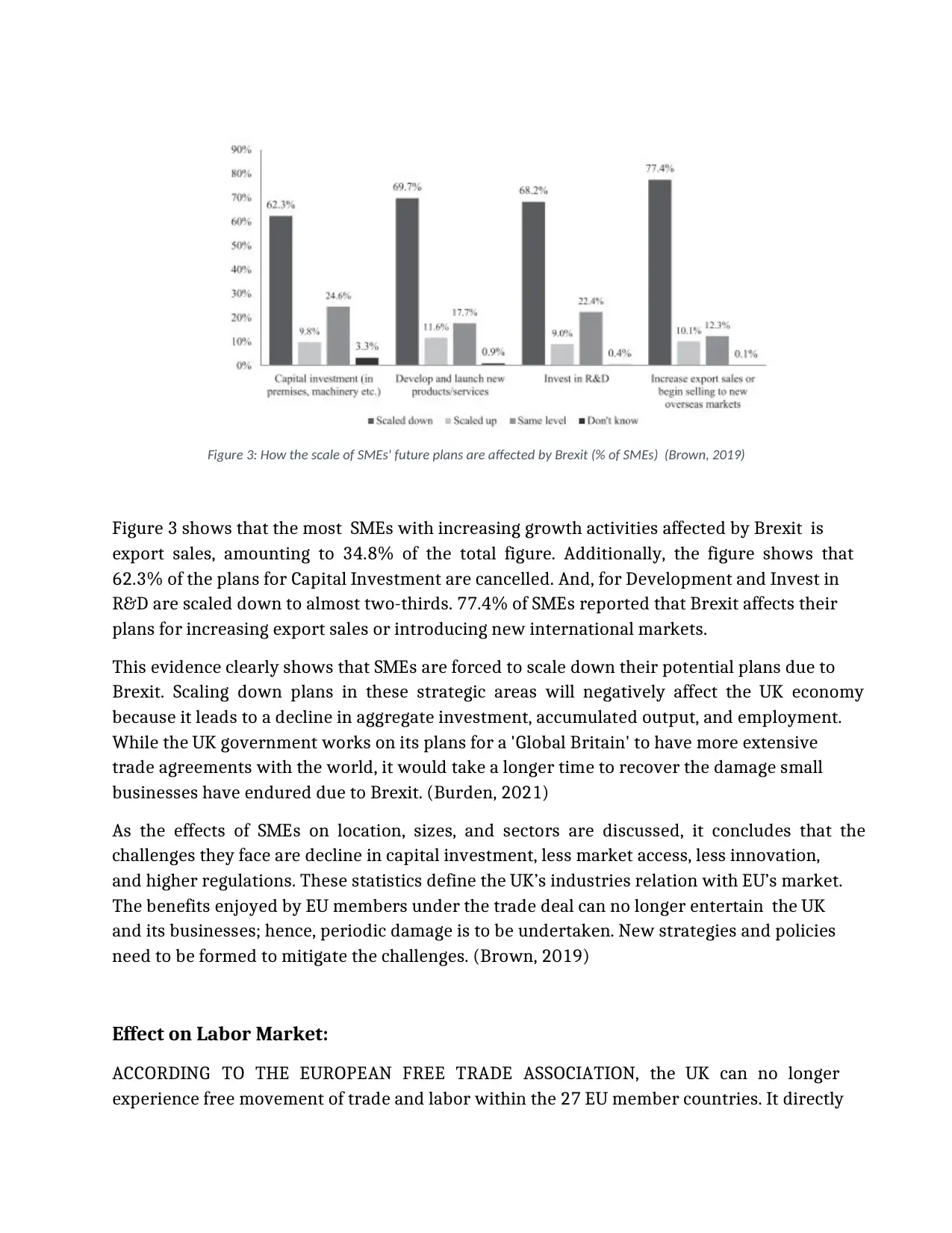
Figure 3: How the scale of SMEs' future plans are affected by Brexit (% of SMEs) (Brown, 2019)
Figure 3 shows that the most SMEs with increasing growth activities affected by Brexit is
export sales, amounting to 34.8% of the total figure. Additionally, the figure shows that
62.3% of the plans for Capital Investment are cancelled. And, for Development and Invest in
R&D are scaled down to almost two-thirds. 77.4% of SMEs reported that Brexit affects their
plans for increasing export sales or introducing new international markets.
This evidence clearly shows that SMEs are forced to scale down their potential plans due to
Brexit. Scaling down plans in these strategic areas will negatively affect the UK economy
because it leads to a decline in aggregate investment, accumulated output, and employment.
While the UK government works on its plans for a 'Global Britain' to have more extensive
trade agreements with the world, it would take a longer time to recover the damage small
businesses have endured due to Brexit. (Burden, 2021)
As the effects of SMEs on location, sizes, and sectors are discussed, it concludes that the
challenges they face are decline in capital investment, less market access, less innovation,
and higher regulations. These statistics define the UK’s industries relation with EU’s market.
The benefits enjoyed by EU members under the trade deal can no longer entertain the UK
and its businesses; hence, periodic damage is to be undertaken. New strategies and policies
need to be formed to mitigate the challenges. (Brown, 2019)
Effect on Labor Market:
ACCORDING TO THE EUROPEAN FREE TRADE ASSOCIATION, the UK can no longer
experience free movement of trade and labor within the 27 EU member countries. It directly
Figure 3 shows that the most SMEs with increasing growth activities affected by Brexit is
export sales, amounting to 34.8% of the total figure. Additionally, the figure shows that
62.3% of the plans for Capital Investment are cancelled. And, for Development and Invest in
R&D are scaled down to almost two-thirds. 77.4% of SMEs reported that Brexit affects their
plans for increasing export sales or introducing new international markets.
This evidence clearly shows that SMEs are forced to scale down their potential plans due to
Brexit. Scaling down plans in these strategic areas will negatively affect the UK economy
because it leads to a decline in aggregate investment, accumulated output, and employment.
While the UK government works on its plans for a 'Global Britain' to have more extensive
trade agreements with the world, it would take a longer time to recover the damage small
businesses have endured due to Brexit. (Burden, 2021)
As the effects of SMEs on location, sizes, and sectors are discussed, it concludes that the
challenges they face are decline in capital investment, less market access, less innovation,
and higher regulations. These statistics define the UK’s industries relation with EU’s market.
The benefits enjoyed by EU members under the trade deal can no longer entertain the UK
and its businesses; hence, periodic damage is to be undertaken. New strategies and policies
need to be formed to mitigate the challenges. (Brown, 2019)
Effect on Labor Market:
ACCORDING TO THE EUROPEAN FREE TRADE ASSOCIATION, the UK can no longer
experience free movement of trade and labor within the 27 EU member countries. It directly
⊘ This is a preview!⊘
Do you want full access?
Subscribe today to unlock all pages.

Trusted by 1+ million students worldwide
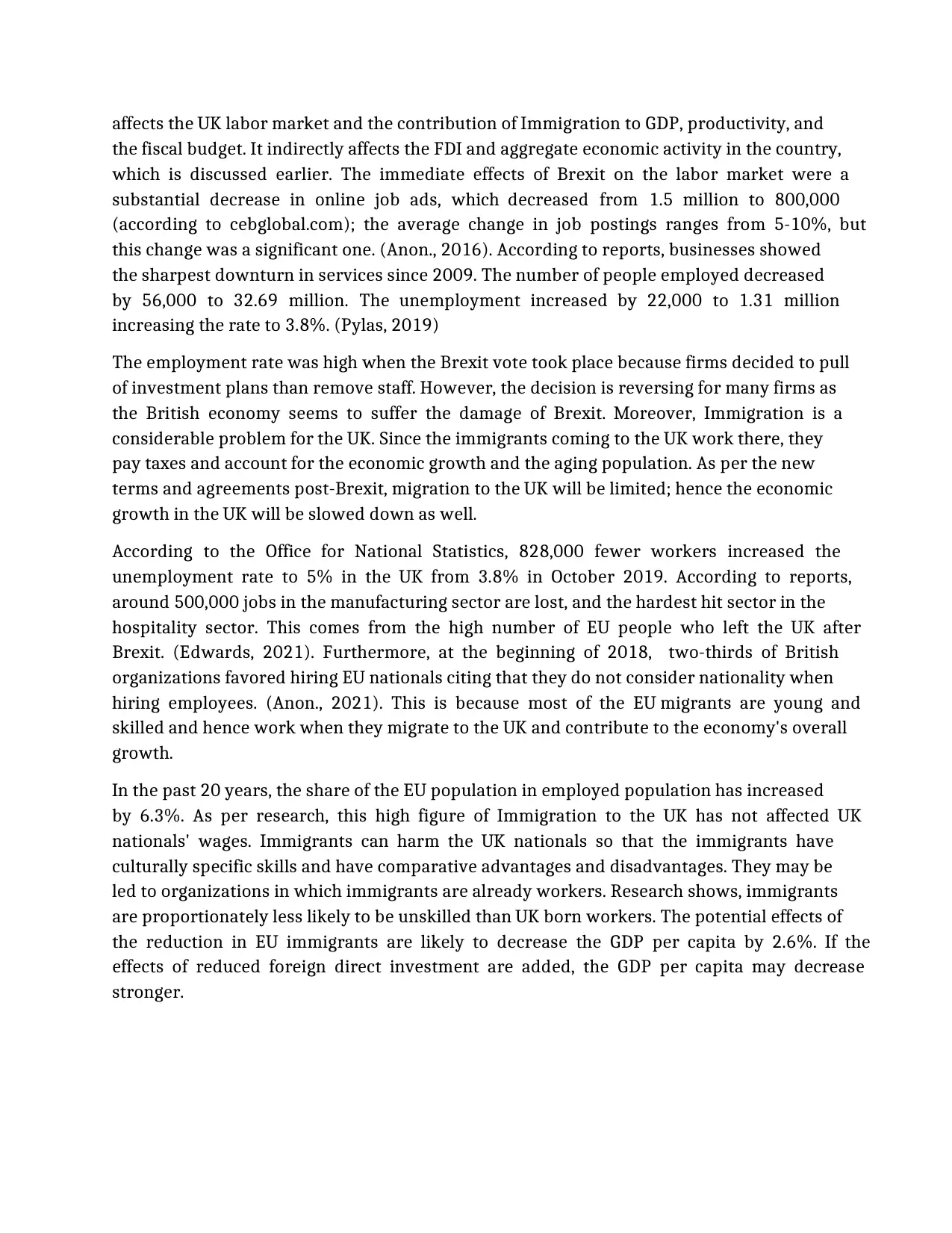
affects the UK labor market and the contribution of Immigration to GDP, productivity, and
the fiscal budget. It indirectly affects the FDI and aggregate economic activity in the country,
which is discussed earlier. The immediate effects of Brexit on the labor market were a
substantial decrease in online job ads, which decreased from 1.5 million to 800,000
(according to cebglobal.com); the average change in job postings ranges from 5-10%, but
this change was a significant one. (Anon., 2016). According to reports, businesses showed
the sharpest downturn in services since 2009. The number of people employed decreased
by 56,000 to 32.69 million. The unemployment increased by 22,000 to 1.31 million
increasing the rate to 3.8%. (Pylas, 2019)
The employment rate was high when the Brexit vote took place because firms decided to pull
of investment plans than remove staff. However, the decision is reversing for many firms as
the British economy seems to suffer the damage of Brexit. Moreover, Immigration is a
considerable problem for the UK. Since the immigrants coming to the UK work there, they
pay taxes and account for the economic growth and the aging population. As per the new
terms and agreements post-Brexit, migration to the UK will be limited; hence the economic
growth in the UK will be slowed down as well.
According to the Office for National Statistics, 828,000 fewer workers increased the
unemployment rate to 5% in the UK from 3.8% in October 2019. According to reports,
around 500,000 jobs in the manufacturing sector are lost, and the hardest hit sector in the
hospitality sector. This comes from the high number of EU people who left the UK after
Brexit. (Edwards, 2021). Furthermore, at the beginning of 2018, two-thirds of British
organizations favored hiring EU nationals citing that they do not consider nationality when
hiring employees. (Anon., 2021). This is because most of the EU migrants are young and
skilled and hence work when they migrate to the UK and contribute to the economy's overall
growth.
In the past 20 years, the share of the EU population in employed population has increased
by 6.3%. As per research, this high figure of Immigration to the UK has not affected UK
nationals' wages. Immigrants can harm the UK nationals so that the immigrants have
culturally specific skills and have comparative advantages and disadvantages. They may be
led to organizations in which immigrants are already workers. Research shows, immigrants
are proportionately less likely to be unskilled than UK born workers. The potential effects of
the reduction in EU immigrants are likely to decrease the GDP per capita by 2.6%. If the
effects of reduced foreign direct investment are added, the GDP per capita may decrease
stronger.
the fiscal budget. It indirectly affects the FDI and aggregate economic activity in the country,
which is discussed earlier. The immediate effects of Brexit on the labor market were a
substantial decrease in online job ads, which decreased from 1.5 million to 800,000
(according to cebglobal.com); the average change in job postings ranges from 5-10%, but
this change was a significant one. (Anon., 2016). According to reports, businesses showed
the sharpest downturn in services since 2009. The number of people employed decreased
by 56,000 to 32.69 million. The unemployment increased by 22,000 to 1.31 million
increasing the rate to 3.8%. (Pylas, 2019)
The employment rate was high when the Brexit vote took place because firms decided to pull
of investment plans than remove staff. However, the decision is reversing for many firms as
the British economy seems to suffer the damage of Brexit. Moreover, Immigration is a
considerable problem for the UK. Since the immigrants coming to the UK work there, they
pay taxes and account for the economic growth and the aging population. As per the new
terms and agreements post-Brexit, migration to the UK will be limited; hence the economic
growth in the UK will be slowed down as well.
According to the Office for National Statistics, 828,000 fewer workers increased the
unemployment rate to 5% in the UK from 3.8% in October 2019. According to reports,
around 500,000 jobs in the manufacturing sector are lost, and the hardest hit sector in the
hospitality sector. This comes from the high number of EU people who left the UK after
Brexit. (Edwards, 2021). Furthermore, at the beginning of 2018, two-thirds of British
organizations favored hiring EU nationals citing that they do not consider nationality when
hiring employees. (Anon., 2021). This is because most of the EU migrants are young and
skilled and hence work when they migrate to the UK and contribute to the economy's overall
growth.
In the past 20 years, the share of the EU population in employed population has increased
by 6.3%. As per research, this high figure of Immigration to the UK has not affected UK
nationals' wages. Immigrants can harm the UK nationals so that the immigrants have
culturally specific skills and have comparative advantages and disadvantages. They may be
led to organizations in which immigrants are already workers. Research shows, immigrants
are proportionately less likely to be unskilled than UK born workers. The potential effects of
the reduction in EU immigrants are likely to decrease the GDP per capita by 2.6%. If the
effects of reduced foreign direct investment are added, the GDP per capita may decrease
stronger.
Paraphrase This Document
Need a fresh take? Get an instant paraphrase of this document with our AI Paraphraser
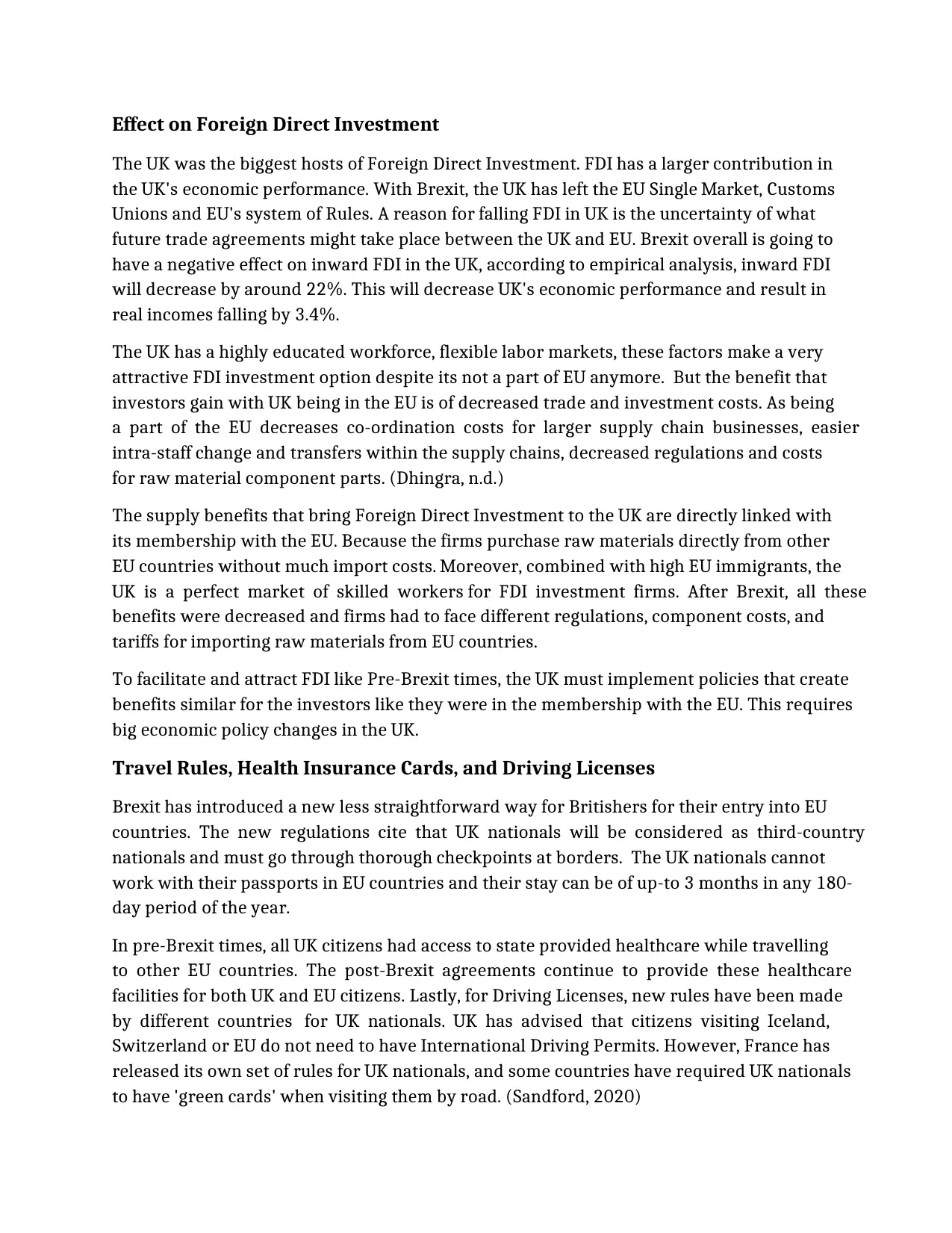
Effect on Foreign Direct Investment
The UK was the biggest hosts of Foreign Direct Investment. FDI has a larger contribution in
the UK's economic performance. With Brexit, the UK has left the EU Single Market, Customs
Unions and EU's system of Rules. A reason for falling FDI in UK is the uncertainty of what
future trade agreements might take place between the UK and EU. Brexit overall is going to
have a negative effect on inward FDI in the UK, according to empirical analysis, inward FDI
will decrease by around 22%. This will decrease UK's economic performance and result in
real incomes falling by 3.4%.
The UK has a highly educated workforce, flexible labor markets, these factors make a very
attractive FDI investment option despite its not a part of EU anymore. But the benefit that
investors gain with UK being in the EU is of decreased trade and investment costs. As being
a part of the EU decreases co-ordination costs for larger supply chain businesses, easier
intra-staff change and transfers within the supply chains, decreased regulations and costs
for raw material component parts. (Dhingra, n.d.)
The supply benefits that bring Foreign Direct Investment to the UK are directly linked with
its membership with the EU. Because the firms purchase raw materials directly from other
EU countries without much import costs. Moreover, combined with high EU immigrants, the
UK is a perfect market of skilled workers for FDI investment firms. After Brexit, all these
benefits were decreased and firms had to face different regulations, component costs, and
tariffs for importing raw materials from EU countries.
To facilitate and attract FDI like Pre-Brexit times, the UK must implement policies that create
benefits similar for the investors like they were in the membership with the EU. This requires
big economic policy changes in the UK.
Travel Rules, Health Insurance Cards, and Driving Licenses
Brexit has introduced a new less straightforward way for Britishers for their entry into EU
countries. The new regulations cite that UK nationals will be considered as third-country
nationals and must go through thorough checkpoints at borders. The UK nationals cannot
work with their passports in EU countries and their stay can be of up-to 3 months in any 180-
day period of the year.
In pre-Brexit times, all UK citizens had access to state provided healthcare while travelling
to other EU countries. The post-Brexit agreements continue to provide these healthcare
facilities for both UK and EU citizens. Lastly, for Driving Licenses, new rules have been made
by different countries for UK nationals. UK has advised that citizens visiting Iceland,
Switzerland or EU do not need to have International Driving Permits. However, France has
released its own set of rules for UK nationals, and some countries have required UK nationals
to have 'green cards' when visiting them by road. (Sandford, 2020)
The UK was the biggest hosts of Foreign Direct Investment. FDI has a larger contribution in
the UK's economic performance. With Brexit, the UK has left the EU Single Market, Customs
Unions and EU's system of Rules. A reason for falling FDI in UK is the uncertainty of what
future trade agreements might take place between the UK and EU. Brexit overall is going to
have a negative effect on inward FDI in the UK, according to empirical analysis, inward FDI
will decrease by around 22%. This will decrease UK's economic performance and result in
real incomes falling by 3.4%.
The UK has a highly educated workforce, flexible labor markets, these factors make a very
attractive FDI investment option despite its not a part of EU anymore. But the benefit that
investors gain with UK being in the EU is of decreased trade and investment costs. As being
a part of the EU decreases co-ordination costs for larger supply chain businesses, easier
intra-staff change and transfers within the supply chains, decreased regulations and costs
for raw material component parts. (Dhingra, n.d.)
The supply benefits that bring Foreign Direct Investment to the UK are directly linked with
its membership with the EU. Because the firms purchase raw materials directly from other
EU countries without much import costs. Moreover, combined with high EU immigrants, the
UK is a perfect market of skilled workers for FDI investment firms. After Brexit, all these
benefits were decreased and firms had to face different regulations, component costs, and
tariffs for importing raw materials from EU countries.
To facilitate and attract FDI like Pre-Brexit times, the UK must implement policies that create
benefits similar for the investors like they were in the membership with the EU. This requires
big economic policy changes in the UK.
Travel Rules, Health Insurance Cards, and Driving Licenses
Brexit has introduced a new less straightforward way for Britishers for their entry into EU
countries. The new regulations cite that UK nationals will be considered as third-country
nationals and must go through thorough checkpoints at borders. The UK nationals cannot
work with their passports in EU countries and their stay can be of up-to 3 months in any 180-
day period of the year.
In pre-Brexit times, all UK citizens had access to state provided healthcare while travelling
to other EU countries. The post-Brexit agreements continue to provide these healthcare
facilities for both UK and EU citizens. Lastly, for Driving Licenses, new rules have been made
by different countries for UK nationals. UK has advised that citizens visiting Iceland,
Switzerland or EU do not need to have International Driving Permits. However, France has
released its own set of rules for UK nationals, and some countries have required UK nationals
to have 'green cards' when visiting them by road. (Sandford, 2020)
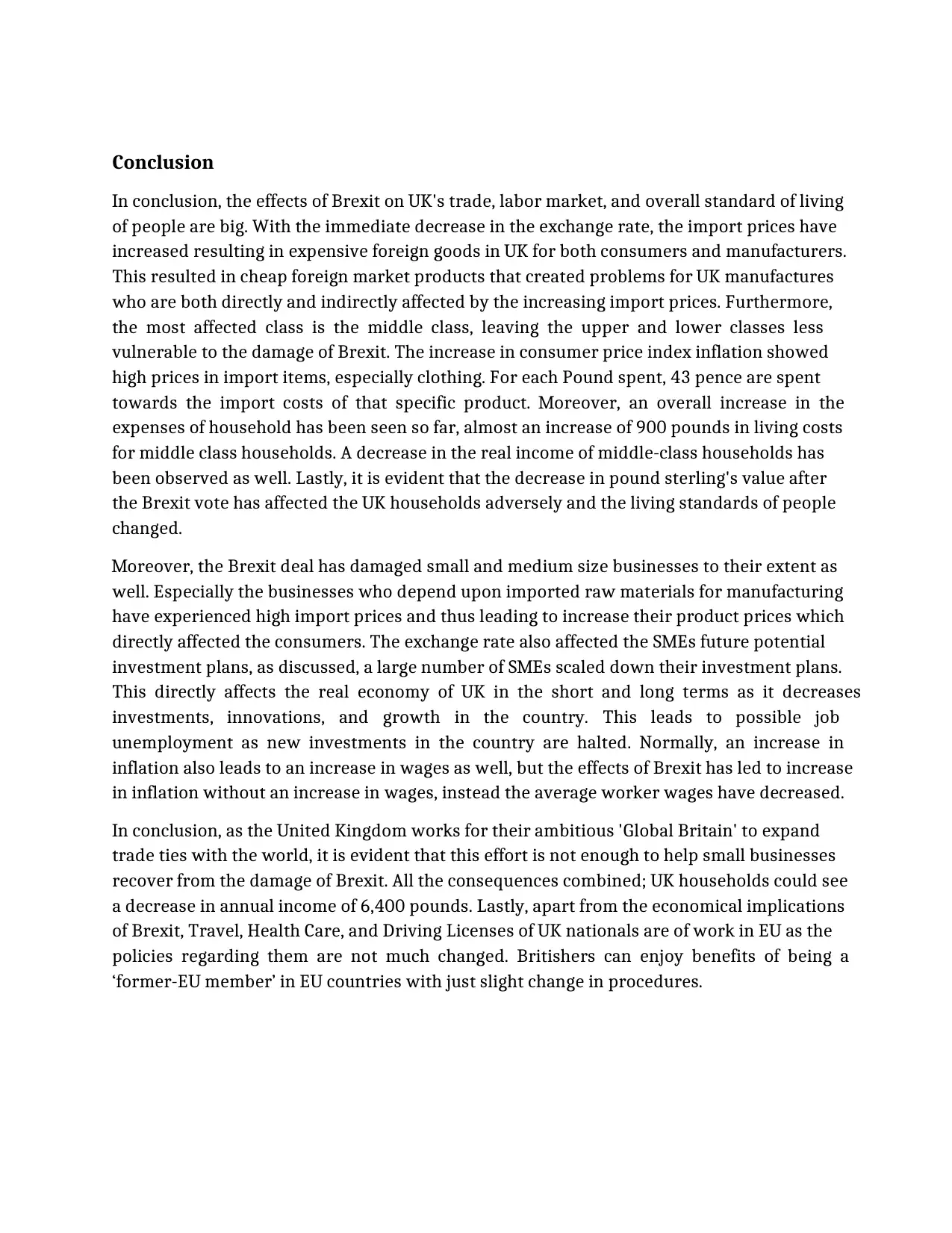
Conclusion
In conclusion, the effects of Brexit on UK's trade, labor market, and overall standard of living
of people are big. With the immediate decrease in the exchange rate, the import prices have
increased resulting in expensive foreign goods in UK for both consumers and manufacturers.
This resulted in cheap foreign market products that created problems for UK manufactures
who are both directly and indirectly affected by the increasing import prices. Furthermore,
the most affected class is the middle class, leaving the upper and lower classes less
vulnerable to the damage of Brexit. The increase in consumer price index inflation showed
high prices in import items, especially clothing. For each Pound spent, 43 pence are spent
towards the import costs of that specific product. Moreover, an overall increase in the
expenses of household has been seen so far, almost an increase of 900 pounds in living costs
for middle class households. A decrease in the real income of middle-class households has
been observed as well. Lastly, it is evident that the decrease in pound sterling's value after
the Brexit vote has affected the UK households adversely and the living standards of people
changed.
Moreover, the Brexit deal has damaged small and medium size businesses to their extent as
well. Especially the businesses who depend upon imported raw materials for manufacturing
have experienced high import prices and thus leading to increase their product prices which
directly affected the consumers. The exchange rate also affected the SMEs future potential
investment plans, as discussed, a large number of SMEs scaled down their investment plans.
This directly affects the real economy of UK in the short and long terms as it decreases
investments, innovations, and growth in the country. This leads to possible job
unemployment as new investments in the country are halted. Normally, an increase in
inflation also leads to an increase in wages as well, but the effects of Brexit has led to increase
in inflation without an increase in wages, instead the average worker wages have decreased.
In conclusion, as the United Kingdom works for their ambitious 'Global Britain' to expand
trade ties with the world, it is evident that this effort is not enough to help small businesses
recover from the damage of Brexit. All the consequences combined; UK households could see
a decrease in annual income of 6,400 pounds. Lastly, apart from the economical implications
of Brexit, Travel, Health Care, and Driving Licenses of UK nationals are of work in EU as the
policies regarding them are not much changed. Britishers can enjoy benefits of being a
‘former-EU member’ in EU countries with just slight change in procedures.
In conclusion, the effects of Brexit on UK's trade, labor market, and overall standard of living
of people are big. With the immediate decrease in the exchange rate, the import prices have
increased resulting in expensive foreign goods in UK for both consumers and manufacturers.
This resulted in cheap foreign market products that created problems for UK manufactures
who are both directly and indirectly affected by the increasing import prices. Furthermore,
the most affected class is the middle class, leaving the upper and lower classes less
vulnerable to the damage of Brexit. The increase in consumer price index inflation showed
high prices in import items, especially clothing. For each Pound spent, 43 pence are spent
towards the import costs of that specific product. Moreover, an overall increase in the
expenses of household has been seen so far, almost an increase of 900 pounds in living costs
for middle class households. A decrease in the real income of middle-class households has
been observed as well. Lastly, it is evident that the decrease in pound sterling's value after
the Brexit vote has affected the UK households adversely and the living standards of people
changed.
Moreover, the Brexit deal has damaged small and medium size businesses to their extent as
well. Especially the businesses who depend upon imported raw materials for manufacturing
have experienced high import prices and thus leading to increase their product prices which
directly affected the consumers. The exchange rate also affected the SMEs future potential
investment plans, as discussed, a large number of SMEs scaled down their investment plans.
This directly affects the real economy of UK in the short and long terms as it decreases
investments, innovations, and growth in the country. This leads to possible job
unemployment as new investments in the country are halted. Normally, an increase in
inflation also leads to an increase in wages as well, but the effects of Brexit has led to increase
in inflation without an increase in wages, instead the average worker wages have decreased.
In conclusion, as the United Kingdom works for their ambitious 'Global Britain' to expand
trade ties with the world, it is evident that this effort is not enough to help small businesses
recover from the damage of Brexit. All the consequences combined; UK households could see
a decrease in annual income of 6,400 pounds. Lastly, apart from the economical implications
of Brexit, Travel, Health Care, and Driving Licenses of UK nationals are of work in EU as the
policies regarding them are not much changed. Britishers can enjoy benefits of being a
‘former-EU member’ in EU countries with just slight change in procedures.
⊘ This is a preview!⊘
Do you want full access?
Subscribe today to unlock all pages.

Trusted by 1+ million students worldwide
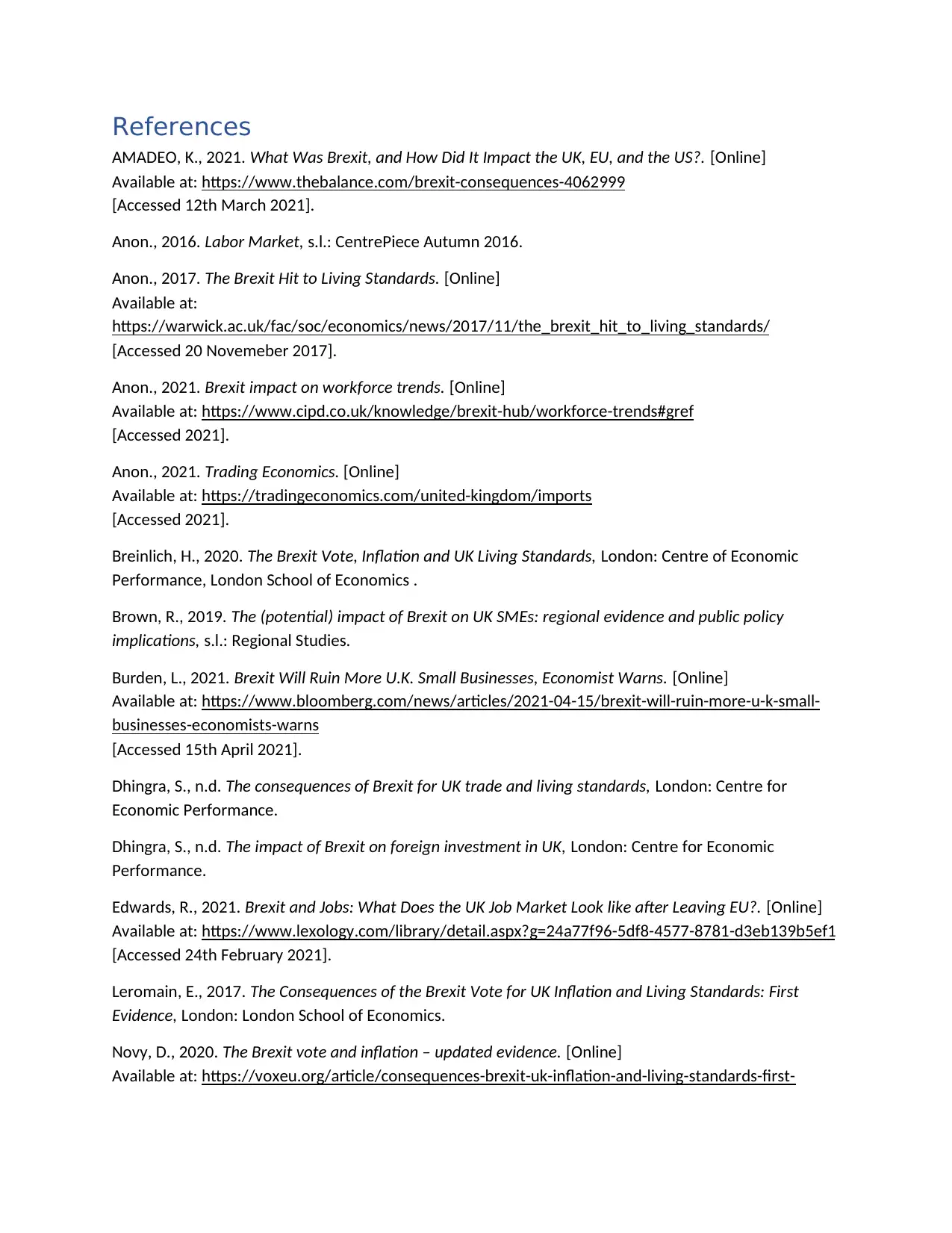
References
AMADEO, K., 2021. What Was Brexit, and How Did It Impact the UK, EU, and the US?. [Online]
Available at: https://www.thebalance.com/brexit-consequences-4062999
[Accessed 12th March 2021].
Anon., 2016. Labor Market, s.l.: CentrePiece Autumn 2016.
Anon., 2017. The Brexit Hit to Living Standards. [Online]
Available at:
https://warwick.ac.uk/fac/soc/economics/news/2017/11/the_brexit_hit_to_living_standards/
[Accessed 20 Novemeber 2017].
Anon., 2021. Brexit impact on workforce trends. [Online]
Available at: https://www.cipd.co.uk/knowledge/brexit-hub/workforce-trends#gref
[Accessed 2021].
Anon., 2021. Trading Economics. [Online]
Available at: https://tradingeconomics.com/united-kingdom/imports
[Accessed 2021].
Breinlich, H., 2020. The Brexit Vote, Inflation and UK Living Standards, London: Centre of Economic
Performance, London School of Economics .
Brown, R., 2019. The (potential) impact of Brexit on UK SMEs: regional evidence and public policy
implications, s.l.: Regional Studies.
Burden, L., 2021. Brexit Will Ruin More U.K. Small Businesses, Economist Warns. [Online]
Available at: https://www.bloomberg.com/news/articles/2021-04-15/brexit-will-ruin-more-u-k-small-
businesses-economists-warns
[Accessed 15th April 2021].
Dhingra, S., n.d. The consequences of Brexit for UK trade and living standards, London: Centre for
Economic Performance.
Dhingra, S., n.d. The impact of Brexit on foreign investment in UK, London: Centre for Economic
Performance.
Edwards, R., 2021. Brexit and Jobs: What Does the UK Job Market Look like after Leaving EU?. [Online]
Available at: https://www.lexology.com/library/detail.aspx?g=24a77f96-5df8-4577-8781-d3eb139b5ef1
[Accessed 24th February 2021].
Leromain, E., 2017. The Consequences of the Brexit Vote for UK Inflation and Living Standards: First
Evidence, London: London School of Economics.
Novy, D., 2020. The Brexit vote and inflation – updated evidence. [Online]
Available at: https://voxeu.org/article/consequences-brexit-uk-inflation-and-living-standards-first-
AMADEO, K., 2021. What Was Brexit, and How Did It Impact the UK, EU, and the US?. [Online]
Available at: https://www.thebalance.com/brexit-consequences-4062999
[Accessed 12th March 2021].
Anon., 2016. Labor Market, s.l.: CentrePiece Autumn 2016.
Anon., 2017. The Brexit Hit to Living Standards. [Online]
Available at:
https://warwick.ac.uk/fac/soc/economics/news/2017/11/the_brexit_hit_to_living_standards/
[Accessed 20 Novemeber 2017].
Anon., 2021. Brexit impact on workforce trends. [Online]
Available at: https://www.cipd.co.uk/knowledge/brexit-hub/workforce-trends#gref
[Accessed 2021].
Anon., 2021. Trading Economics. [Online]
Available at: https://tradingeconomics.com/united-kingdom/imports
[Accessed 2021].
Breinlich, H., 2020. The Brexit Vote, Inflation and UK Living Standards, London: Centre of Economic
Performance, London School of Economics .
Brown, R., 2019. The (potential) impact of Brexit on UK SMEs: regional evidence and public policy
implications, s.l.: Regional Studies.
Burden, L., 2021. Brexit Will Ruin More U.K. Small Businesses, Economist Warns. [Online]
Available at: https://www.bloomberg.com/news/articles/2021-04-15/brexit-will-ruin-more-u-k-small-
businesses-economists-warns
[Accessed 15th April 2021].
Dhingra, S., n.d. The consequences of Brexit for UK trade and living standards, London: Centre for
Economic Performance.
Dhingra, S., n.d. The impact of Brexit on foreign investment in UK, London: Centre for Economic
Performance.
Edwards, R., 2021. Brexit and Jobs: What Does the UK Job Market Look like after Leaving EU?. [Online]
Available at: https://www.lexology.com/library/detail.aspx?g=24a77f96-5df8-4577-8781-d3eb139b5ef1
[Accessed 24th February 2021].
Leromain, E., 2017. The Consequences of the Brexit Vote for UK Inflation and Living Standards: First
Evidence, London: London School of Economics.
Novy, D., 2020. The Brexit vote and inflation – updated evidence. [Online]
Available at: https://voxeu.org/article/consequences-brexit-uk-inflation-and-living-standards-first-
Paraphrase This Document
Need a fresh take? Get an instant paraphrase of this document with our AI Paraphraser
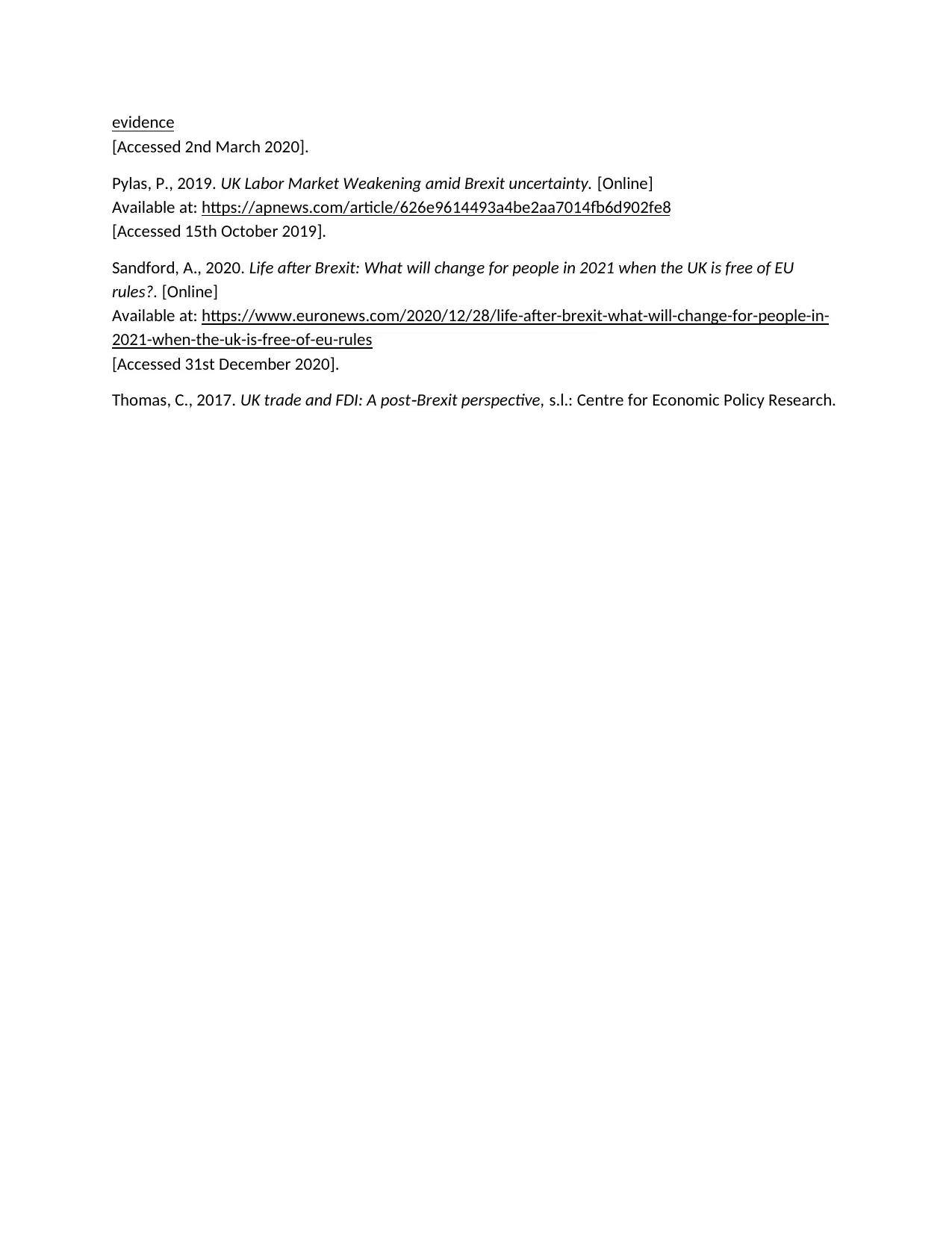
evidence
[Accessed 2nd March 2020].
Pylas, P., 2019. UK Labor Market Weakening amid Brexit uncertainty. [Online]
Available at: https://apnews.com/article/626e9614493a4be2aa7014fb6d902fe8
[Accessed 15th October 2019].
Sandford, A., 2020. Life after Brexit: What will change for people in 2021 when the UK is free of EU
rules?. [Online]
Available at: https://www.euronews.com/2020/12/28/life-after-brexit-what-will-change-for-people-in-
2021-when-the-uk-is-free-of-eu-rules
[Accessed 31st December 2020].
Thomas, C., 2017. UK trade and FDI: A post Brexit perspective,‐ s.l.: Centre for Economic Policy Research.
[Accessed 2nd March 2020].
Pylas, P., 2019. UK Labor Market Weakening amid Brexit uncertainty. [Online]
Available at: https://apnews.com/article/626e9614493a4be2aa7014fb6d902fe8
[Accessed 15th October 2019].
Sandford, A., 2020. Life after Brexit: What will change for people in 2021 when the UK is free of EU
rules?. [Online]
Available at: https://www.euronews.com/2020/12/28/life-after-brexit-what-will-change-for-people-in-
2021-when-the-uk-is-free-of-eu-rules
[Accessed 31st December 2020].
Thomas, C., 2017. UK trade and FDI: A post Brexit perspective,‐ s.l.: Centre for Economic Policy Research.
1 out of 11
Related Documents
Your All-in-One AI-Powered Toolkit for Academic Success.
+13062052269
info@desklib.com
Available 24*7 on WhatsApp / Email
![[object Object]](/_next/static/media/star-bottom.7253800d.svg)
Unlock your academic potential
Copyright © 2020–2026 A2Z Services. All Rights Reserved. Developed and managed by ZUCOL.





